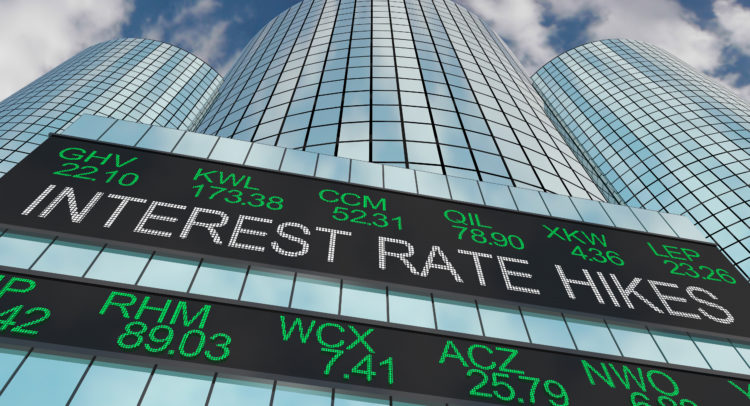First Published 2:18AM EST
Claim 50% Off TipRanks Premium and Invest with Confidence
- Unlock hedge-fund level data and powerful investing tools designed to help you make smarter, sharper decisions
- Stay ahead of the market with the latest news and analysis so your portfolio is always positioned for maximum potential
Major U.S. indices closed in the red today as traders digested another large interest rate hike by the Federal Reserve, a move that was largely expected. In addition, jobless claims increased by 5,000 to 213,000 as compared to the expected figure of 220,000.
The Dow Jones Industrial Average (DJIA), the S&P 500 (SPX), and the Nasdaq 100 (NDX) are down 0.36%, 0.85%, and 1.17%, respectively. Conversely, WTI crude oil is up after giving up yesterday’s early gains in a volatile session.
Meanwhile, bond yields are higher, as the U.S. 10-Year Treasury yield is now hovering around 3.71%. This represents an increase of more than 17 basis points from the previous close.
Similar movements can be seen with the Two-Year yield, which is now at 4.12%. However, the spread between the 10-Year and Two-Year U.S. Treasury yields is still negative, as it currently sits at -41 basis points.
Unsurprisingly, the market is pricing in a higher chance of a higher Fed Funds rate for the end of the year. In fact, the market’s expectations for a rate in the range of 4% to 4.25% decreased to 30.2%, which is down from yesterday’s expectations of 31.1%. In addition, the market is now also assigning a 69.6% probability to a range of 4.25% to 4.5%. For reference, investors had assigned a 67% chance Wednesday.
Also, as the dollar continues to rise, the Bank of England has taken another rate hike and Japan is selling Dollars to prop up Yen.
The Fed’s Comments Worry Wall Street
On Wednesday, the Fed announced the third consecutive 75 basis-point interest rate hike, the fifth rate appraisal this year. Although this move did not come as a surprise, it was the other comments made by the officials that sparked the fear of another possible Volcker Shock.
Policymakers noted that the central bank is not likely to slow down in its crackdown on inflation until the interest rate reaches 4.6% sometime in 2023. Currently, the benchmark rates are between 3% and 3.25%. Recall, this level of interest rates was last seen in early 2008, at a time when the U.S. economy was grappling with the start of the Great Recession.
By the end of 2022, the interest rates are expected to reach at least 4.4%. A pull-back in interest rates is likely to begin after the consistent hikes start generating desired effects on inflation.
How Markets Reacted on Wednesday
The S&P 500, the Dow, and the Nasdaq 100 slipped 1.71%, 1.7%, and 1.8%, respectively at the end of the regular trading session on Wednesday.
The Fed projected the 2022-end economic growth at only 0.2%, and 2023 growth at 2023, both of which are well below the U.S. economy’s potential.
Meanwhile, the unemployment rate is expected to grow by 3.8% this year and 4.4% the next year, which is another cause of worry. The Fed’s target of a 2% inflation rate is expected to be achieved around 2025.
The weekly jobless claims data is due out later on Thursday. This data will give us a better look at the labor market strength.
Some Points to Consider
Meanwhile, due to the pessimism around tech stocks, Alphabet (NASDAQ:GOOGL) (NASDAQ:GOOG) shares are trading at only 18.3x trailing earnings. Given Google’s fundamental strength and strong standing, it appears to give long-term investors a solid window of opportunity to increase their positions in the company.
That said, tech stocks are expected to remain most volatile these coming months as the economy grapples with inflation and high-interest rates. For investors who have money, time, and patience to read the tea leaves, tech stocks can be a perfect choice.
Abu Dhabi Gives a Ray of Hope for Europe’s Gas Scarcity
The Fed’s comments led to a decline in oil prices as well, with investors fearing that a recession might weaken crude demand.
However, as winter approaches, oil and gas prices, are expected to push higher, especially in Europe where the Russia-Ukraine war has wreaked havoc with Europe’s supply. This is a growing concern as oil prices have been fueling inflation globally.
In the wake of this oil crisis, Abu Dhabi’s leading oil company Adnoc was reported by Bloomberg to be in talks to buy Genevese commodity trading house Gunvor Group. If the deal materializes, it will mark a major European investment for Abu Dhabi, which is looking to cash in on the opportunity to solidify its foothold in the European market. Notably, Abu Dhabi is the world’s seventh largest oil producer.
















